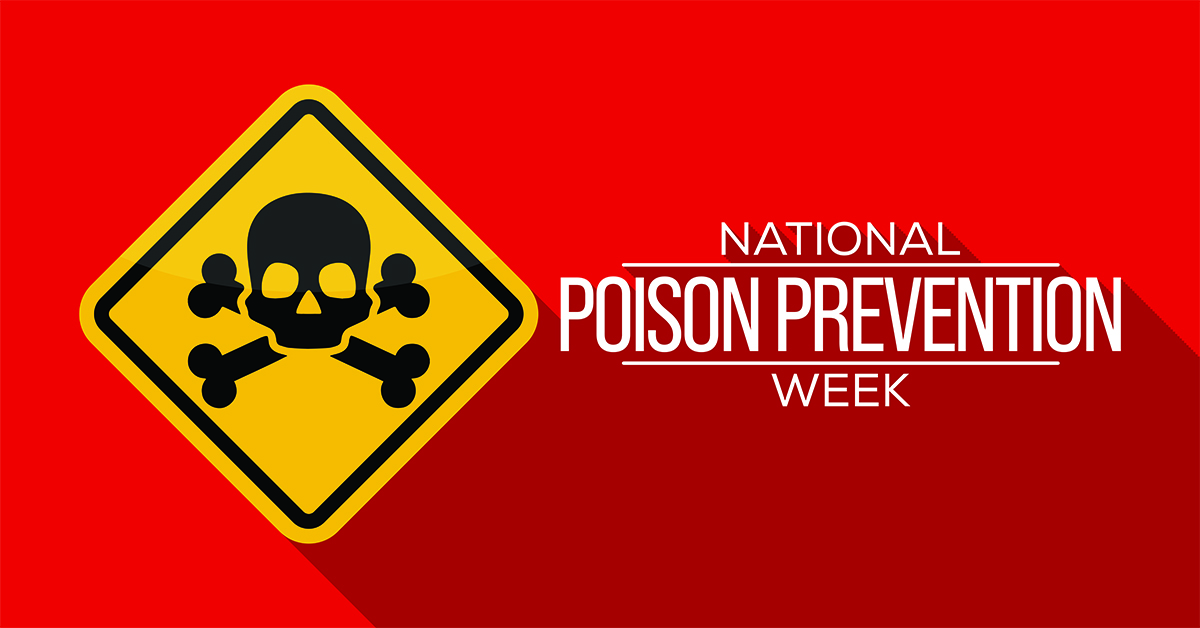Poison Prevention Awareness: Tips to Prevent Poisoning at Home

With National Poison Prevention Awareness Week upon us, there’s never been a better time to increase your knowledge on poison prevention. The national awareness week was introduced back in 1961 under the Kennedy presidency.
Despite efforts to increase awareness, unintentional poisoning remains to be the leading cause of accidental deaths for all age groups. You can observe the week by educating yourself on poison prevention.
Poison Prevention Awareness Facts
Poisoning incidents disproportionately affect children under the age of six. According to the CDC, more than 300 children in the United States are treated in the emergency department due to poisoning every day. Of these 300 children admitted, two will die.
It’s a somber statistic. But you can help prevent poisoning by following some simple tips from the American Association of Poison Control Centers.
Preventing Poisoning with Medicines
Medicines kept in the home are poisonous in the right quantities or for the wrong person. To prevent poisoning, you should keep all your medicines in locked cabinets. Ideally, these cabinets should be out of reach of children.
To avoid confusion, store all medicines as prescribed on the packet. You should also keep them in their original containers to avoid any mix-ups.
Carbon Monoxide (CO)
Carbon monoxide is a poisonous gas. What makes it more dangerous is that typically, carbon monoxide is odorless – meaning we have no indication of when it may be present in the home. Breathing too much carbon monoxide can make you unwell and can even kill you if the exposure is high.
Symptoms of carbon monoxide poisoning include headache, nausea, vomiting, dizziness, fatigue, confusion, stomach pain, and difficulty breathing.
Ensure that you have a working carbon monoxide detector in your home. If possible, place it near a bedroom or a furnace.
Household Products
Many household products such as cleaning products are poisonous when ingested or inhaled. Follow the product instructions to ensure your safety when using them. Bleach, in particular, should not be mixed with any other substances, excluding water.
Like medicines, you should keep all household cleaning products and other hazardous substances in a locked cabinet, out of reach of children. Keep products in their original packaging.
Food Poisoning Prevention Tips
Observing good food hygiene will help your family avoid food poisoning.
Avoid washing poultry, meat, or eggs. Only wash fruits and vegetables under running water. Never use commercial cleaning products on any food.
Regularly wash your hands when preparing food. You should also disinfect or clean the surfaces you’re using while preparing food.
Store food at the correct temperature. Refrigerated foods should never be left out in temperatures above 40°F (5°C).
How to Prevent Poisoning in Nature
Educate yourself on the different poisonous animals and insects that live in your area. Wear appropriate attire, like boots, when exploring outdoors.
It is also a good idea to familiarize yourself on the different poisonous mushrooms and plants that are native to your area. Your local poison center can help you with this.
What to Do in an Emergency
If you think you or a loved one has been poisoned, call the National Poison Hotline at 1-800-222-1222 for free. It’s open 24/7, 365 days a year.
Alternatively, you may go to your local ER in Corpus Christi, Texas in case of a medical emergency.
Sources:
American association of poison control centers, https://aapcc.org/prevention
Tips to prevent poisonings, CDC, https://www.cdc.gov/homeandrecreationalsafety/poisoning/preventiontips.htm


